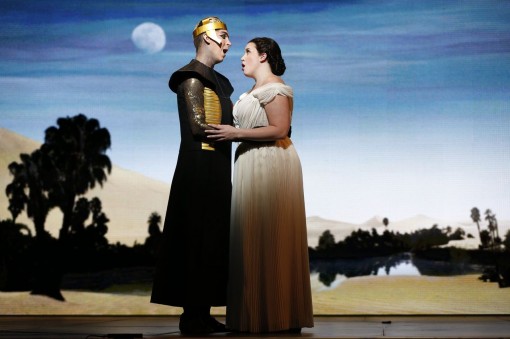Even with rough edges, NY City Opera’s “Mosè” reaches sublime heights

Randall Bills and Siân Davies in New York City Opera’s production of Rossini’s “Mosè in Egitto.” Photo: Carol Rosegg
Opera as a public spectacle was born in Venice, as a carnival entertainment, but over the centuries the form became so popular on the Italian peninsula that operas on religious themes sometimes played during Lent. One such work is Rossini’s rarely performed masterpiece Mosè in Egitto, the 1818–20 azione tragico-sacra based on the Biblical book of Exodus, with a libretto by Andrea Leone Tottola.
On Sunday New York City Opera’s patchy but welcome production of Mosè opened at New York City Center, one of the now-itinerant company’s homes. Any chance to see and hear a Rossini opera seria in these parts must be seized. Besides Armida, staged as something of a burlesque, the Metropolitan Opera has offered only comic Rossini for two decades. New York’s finest recent performance of a serious Rossini work was given by City Opera at its former Lincoln Center abode: Ermione, sung with unhinged bravura by Alexandrina Pendatchanska and Barry Banks back in 2004.
In tone, form, and level of inspiration, Mosè is an astonishing opera. Without an overture, it opens with a stabbing C-minor figure in the orchestra as grim as the plague of darkness that enshrouds the Egyptians in the first scene. Moses’s prayer Eterno! immenso! incomprensibil Dio! and the triumphant return of the light are cast in grandiose, intricately scored strains that recall Haydn’s Creation and Mozart’s Requiem, works that Rossini revered.
Act I ends with plagues of hail and fire; Act II with Pharaoh’s son Osiride felled by heavenly lightning; and Act III with the Israelites’ crossing of the Red Sea and the Egyptians “cast into the sea.” Mosè interweaves these Biblical events with the tale of the unhappy love between Elcia, an Israelite maiden, and the incinerated Osiride. Wrought at a time when singers were expected to be musicians and not foghorns, the vocal writing throughout demands an extreme degree of technical polish.
City Opera’s valiant cast and production team do not conquer all of Mosè’s challenges, but their efforts won thunderous applause on Sunday. Michael Counts’ staging, with costumes by Jessica Jahn, lighting by Ryan O’Gara, choreography by Ken Roht, and videos by Ada Whitney, has no sets to speak of. The characters strike hieratic poses or appear to “travel” across rotating stage platforms as the ever-shifting video backdrop variously depicts the firmament, oases and dunes, flames, and sharp black and white forms.
Counts carries off one breathtaking illusion in Act II, when Elcia and Osiride seem to travel across the desert, enter a yawning cavern, and then emerge from it again. That said, the incessant motion effects are sometimes overdone—Mosè’s prime mover, after all, is not one of the human characters—and viewers prone to queasiness need to pop a motion-sickness tablet before seeing this show.
City Center’s acoustics, at least where I was sitting, are bone-dry and tend to accentuate every niggling vocal or instrumental flaw. City Opera’s newly appointed music director Jayce Ogren led a beautifully shaped account of the score with supple, mellifluous contributions from the wind section; the strings sounded anemic and scratchy.
The pearly timbre and fastidious musicianship of Siân Davies bring to mind Ruth Ann Swenson, and Davies went from strength to strength in Elcia’s punishing Act II music—a long duet followed by a quartet and a soaring concertato. The singing of Keri Alkema as Amaltea, Pharaoh’s consort, was sometimes wild and always commanding. Alkema’s voice has a seductive, smoky quality, and she ornamented her music with fire and imagination and played her imposing role to the hilt.
Replacing the indisposed David Cushing, David Salsbery Fry was Mosè and Wayne Tigges his adversary Faraone. The clash between these two dark male voices is positively Verdian in grandeur. Neither singer was at ease in the highest and lowest reaches of his role or in Rossini’s florid writing, but Fry gave an aptly earnest account of Dal tuo stellato soglio, Mosè’s Act III prayer with chorus that even George Bernard Shaw, no friend to Rossini, deemed “sublime.”
Randall Bills as Osiride tore through his fioritura with panache and bright, sometimes reedy tone, and Aldo Caputo was a bold and crisply expressive Aronne. (Like Schoenberg, Rossini cast the sweet-tongued priest as a tenor.) Zachary Finkelstein, his skin a dastardly shade of blue, was the unctuous Mambre, a cleric who plots against the Israelites; and Emily Righter sang splendidly and cut a winning figure as the Israelite Amenofi. Bruce Stasyna’s chorus did yeoman’s service but, like the orchestra, was not flattered by City Center’s acoustical qualities.
The final moments of Mosè in City Opera’s staging are stunning. After the Israelites pass through the sea, the video imagery shows inky shadows billow in the water: perhaps the Biblical “pillar of the cloud” that was a “darkness” to their foes. The blackness engulfs the Egyptians, and for several long moments we watch in horror as silhouettes of men and women drift helplessly, drowning in the whirling tide. And then, as Rossini’s score shifts to a luminous C major, the projected imagery sweeps upward, and we leave behind the belly of the sea to gaze upon the star-drenched heavens.
Jewish tradition teaches that the angels broke into songs of praise when the Israelites were delivered and the Egyptian destroyed, but that the Almighty rebuked them, asking “My creatures perish, and you exult?” That starry sky is a reminder of divine might and providence, and it may also hint that the Egyptians, though broken and defeated, have been gathered to their creator’s bosom. Rossini and his librettist surely knew no Midrash, but the beauty and majesty of their opera sanction no less generous a reading.
New York City Opera’s production of Rossini’s Mosè in Egitto will be repeated April 16, 18, and 20 at New York City Center, 131 West 55th Street in Manhattan. nycopera.com; 212.581.1212.